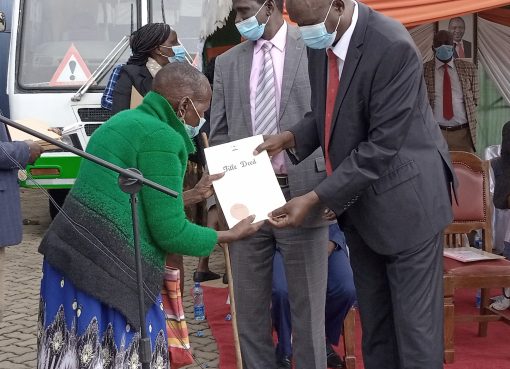The Micro and Small Enterprise Authority (MSEA) under the State Department for Micro, Small and Medium Enterprises (MSMEs) Development sensitized its members from the North Rift region on the Micro Small and Medium Enterprise Authority (MSME) Policy 2025 and the Micro and Small Enterprise Amendment Bill 2025.
The policy seeks to harmonize all regulatory frameworks for the MSME sector like formalization and fostering entrepreneurial culture and enhancing skills development for MSMEs.
Speaking during the public sensitization forum on MSME Policy 2025, MSME Amendment Bill 2025, Eldoret, Uasin Gishu, the Team Lead for MSEA Tom Maruti who is also the Director for Hustler Fund, indicated that the amendments to the Micro and Small Enterprises (MSEs) ACT 2012 to Micro, Small and Medium Enterprises (MSMEs) ACT 2025 seeks to promote growth of the sector to even medium enterprises through strengthening enabling legal, policy and regulatory environment for MSMEs, promoting formalization, enhancing access to decent and affordable infrastructure, enhanced market access and economic opportunities and promoting innovation, research and development for MSMEs.
He explained that Micro Enterprises were those with annual turnover of less than Sh1 million, Small with a turn over between Sh1 million and Sh5 million annually while Micro ones earned between Sh5 million and Sh25 million.
“The reviewed MSME policy will facilitate the alignment and amendment of the MSME Act of 2012,” he noted.
The rationale for formulating the policy on MSMEs is three-fold which entails addressing issues identified under the previous MSEs policy 2020, integrating new MSMSE support approach as espoused under the MTP4 such as including value chain approach and cluster development and addressing emerging issues captured through literature review, Kenya international commitments like the Sustainable Development Goals (SDGs), AU Agenda 2063, The African Continental Free Trade Area (AfCFTA) and others.
In her remarks, Micro and Small Enterprises (MSEs) Registrar Grace Maureen Chogo underscored that if passed into law, the new policy would help address challenges facing the MSME sector covering like entrepreneurial culture, skills for MSMEs capacity, access to markets and linkages, access to financial services and others.
Additionally, the policy will further address emerging issues and opportunities for growth and sustainability of the MSME sector which include gender equality and social inclusion, value chain approach, market expansion through trade agreements, participation in sustainable supply chains and MSME Resilience and adaptability.
“This policy aims to create an integrated enabling business environment for a productive competitive and sustainable MSME sector for wealth and employment creation,” she said.

MSEA North Rift Regional Director CPA Alton Kogo emphasized the Authority’s commitment to promoting and developing MSMEs to support the government’s Bottom-Up Economic Transformation Agenda (BETA).
Ainabkoi Deputy County Commissioner (DCC) Henry Rop underscored that the sector plays a very important role in Kenya’s economy, offering employment to about 14.5 million people and contributing up to 38 to 40 percent of the GDP.
“That is why the government is focusing more on the Jua kali sector, improving financial and market linkages. We want the sector expanded to absorb the majority of youth who graduate from our tertiary institutions each year but fail to secure formal employment,” explained the DCC.
Members of the MSME sector led by the Secretary General Uasin Gishu Jua Kali Association Richard Opar welcomed the new policy and amendment, noting that it would allow the MSEA to advocate effectively for the affairs and interest of the Jua kali sector.
“Jua kali sector is the cornerstone of our skilled based country’s economy, through the new regulations, we will have enhanced ability to exploit our full manufacturing and exportation potential,” explained Opar.
He commended the government for its great efforts to revolutionize Jua Kali sector through simplified formalization processes for MSEs, promotion of skills development like the Recognition of Prior Learning (RPL) and the introduction of various employment projects like Kenya Jobs and Economic Transformation (KJET) and The National Youth Opportunities Towards Advancement (NYOTA).
By Ekuwam Sylvester





